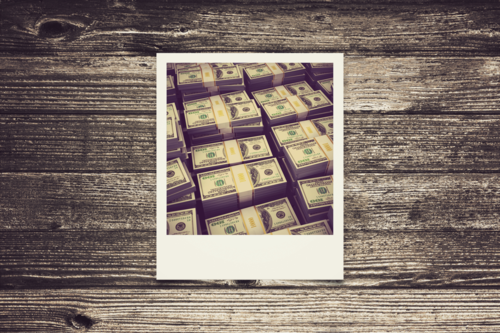
What’s the best filter to say “filthy rich?” (Image: Thinkstock, photo illustration: Daniel Bean/Yahoo Tech)
Brian DiFeo still remembers the first time he was paid to take an Instagram photo. It was winter 2012, and he was roaming between show tents at Lincoln Center for New York Fashion Week, snapping photos of a little-known fashion label’s handbags.
"I posted like, eight photos for $100, or something," DiFeo told Yahoo Tech, chuckling at the sum. "We really didn’t know what our value was then."
These days, a deal like that probably wouldn’t fly. DiFeo would first have to run through a few calculations based on the size of his Instagram account’s following (110,000 people) and its general tendency to “heart” and comment on his images — that vague metric called “engagement.” Then he’d consider the number of photos required, and whether they were conceptual or featured the actual product in question. Finally, he’d settle on a fee that considers just how much exposure he could bring to that handbag label — a fee that, three years later, is much more than $100.
This is what Defio and his business partner, Anthony Danielle, do for a living at the Mobile Media Lab, a consulting firm that connects popular Instagram photographers with brands to coordinate and execute paid promotional campaigns on the social networking site. It’s one of many talent agencies that have found a lucrative business in striking brand placement deals with those photographers who are considered “famous on Instagram.” The company represents a new era of advertisement, where the focus doesn’t lie just on a product or a celebrity but on the community and reach of one specific social platform.
Nearly three years since their company’s launch, DiFeo and Danielle have amassed a network of about 400 independent Instagrammers, with followings ranging from the 10,000s to the 500,000s and a combined audience of about 60 million people.
It’s no wonder that the agency has been able to attract high-profile brands like Timex, Stoli, Expedia, and Puma as clients.
From Meet-Ups to Media Darlings
Five years ago, a lineup of famous clients like this would have been unimaginable. Danielle and DiFeo were amateur photographers in New York when they joined Instagram in October 2010, the month it officially launched in cities outside the Bay Area. To pay the bills, Danielle dealt with royalties and contracts in the music publishing industry, and DiFeo ran an entrepreneurs co-working space.
The two gelled with Instagram’s medium quickly, posting photos of New York City, amassing fanbases, and making digital friends. About two months after they’d downloaded the app, they noticed each other’s work via a common hashtag. They followed one another, and began liking and commenting on each other’s photos.
They hit it off so well that in March 2011, DiFeo organized a meet-up (named Instagram NYC) to meet Danielle and match faces with some of the other handles he’d been following on the network.
"That meet-up group really snowballed," DiFeo said. Instagram’s public relations team noticed and wrote about the event on its company blog. After that, the two landed a piece in the Village Voice. Soon enough, brands started to reach out, offering to hire them for gigs.
"That made us understand our worth," said DiFeo. "We said, brands don’t really get Instagram, so let’s start a company to shape the ways they advertise on a platform. That was the birth of this network."
Booming Business
The same year that Mobile Media Lab launched, Instagram itself began its ascent to social media royalty. In April 2012, Facebook bought the 13-person startup in a $1 billion deal. Two years later, the app hit 300 million monthly active users, surpassing rival Twitter.
That staggering growth has translated into real dollar value for Instagram’s power photographers. Celebrities like Taylor Swift, Rihanna, and the Kardashian clan command followings in the millions, allowing for lucrative brand partnerships or valuable self-promotion of their clothing lines, perfumes, or iTunes singles.
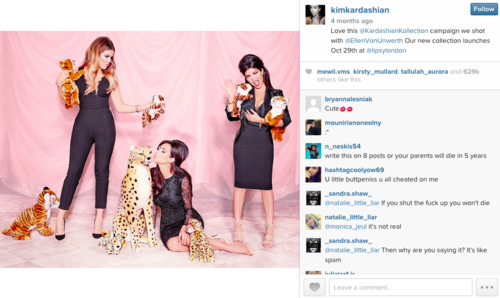
As famous names joined Instagram, agencies similar to the Mobile Media Lab were there to meet them in cyberspace. Beverly Hills-basedDigital Media Management, for instance, specializes as a broker between celebrities and brands, arranging campaigns that are specially tailored for platforms like Instagram. The brands get exposure, the celebrities get paid, and everyone wins.
Digital Media Management divides its social media talent into two categories: celebrities and “social influencers.” Social influencers are part of the new media era, homegrown talents that have become famous on channels like YouTube, Vine, and, of course, Instagram. Though they command a lower fee for brand partnerships, their influence is sometimes combined with celebrity promotion to buffer an ad campaign. The company’s Women’s Influencer Network, for instance, includes both powerhouse Instagrammers and Hollywood stars like Elizabeth Banks. Brands will call up Digital Media Management and describe the demographic they want to reach, then Digital Media Management will connect them with mix of celebrities and social influencers for the job. So far the agency’s Women’s Influencer Network has worked with groups like Sprint, Febreze, Subway, and Vidal Sassoon.
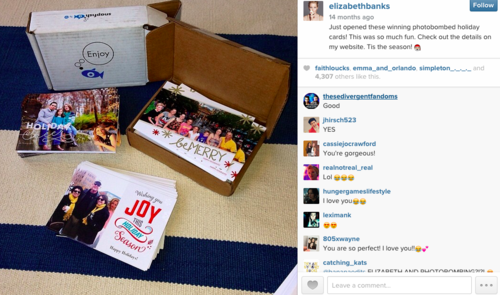
Elizabeth Banks advertises a photobomb holiday card, made by the photo-printing company Snapfish. The caption asks her followers to visit her website, where there’s a sponsored post on the product. (Instagram)
Other agencies, like Talent Resources, work as exclusive brokers between high-profile celebrities and brands. When the little-known diet tea MateFit came to the company for help, it picked a handful of celebrities with notable Instagram followings — including Big Sean and Nicki Minaj — to feature the company’s plastic bottle in their feeds. Talent Resources helped come up with concepts for the four MateFit-related photos that each celebrity posted on his or her account. Though Matt Kirschner, talent resources director of celebrity relations, declined to say how much celebrities get paid for transactions like this, he says more stars are taking the hint.
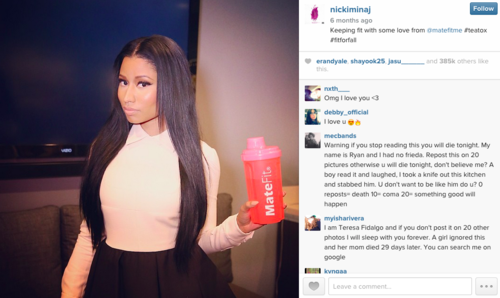
Nicki Minaj’s caption reads: “Keeping fit with some love from@matefitme #teatox#fitforfall.” (Instagram)
“We have seen a great influx of talent in the social media landscape over the last few years,” he told Yahoo Tech. “Traditional celebrities (the younger members of Hollywood at least) are catching up.”
Moneymakers
Danielle and DiFeo, however, are not in the business of representing Nicki Minaj, and are therefore much more open about the rates that one of their clients can command.
"It depends on who [the person is], but if you want a bottle of Coca-Cola in a photo for someone with 100,000 followers, and who gets 2,000 likes on a photo, that person would probably be happy with around $750 bucks," Danielle said.
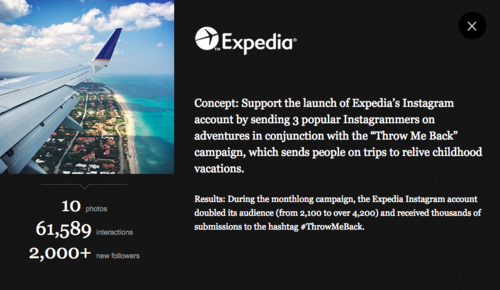
The concept and reach of the Mobile Media Lab’s Expedia campaign. (Via The Mobile Media Lab)
The Instagrammers that they represent who have more than 100,000 followers can break into the $700 to $900 dollar range. And if you have 500,000 followers, you’re looking at between $2,000 and $3,000. Though $4,000 is the highest that the Mobile Media Lab has ever paid for one photo, DiFeo says he knows some fashion-centric Instagrammers get double that for just one photo.
And how does that compare to, say, the fee Kim Kardashian commands for a sponsored Instagram post?
"I shudder to think how much that might cost," DiFeo said.

0 comments:
Post a Comment